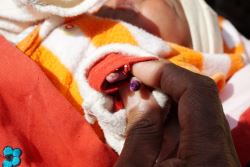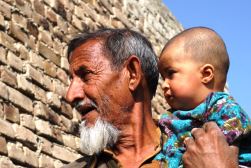This World Immunization Week, the global goal of polio eradication is closer than ever, although more needs to be done to deliver a world free from the disease.
 To deliver a polio-free world, every child in the remaining polio reservoirs – Pakistan and Afghanistan – must be vaccinated. The purple ink dot on this babies’ finger shows that they have received the oral polio vaccine. Photo credits: WHO28 April 2016 – WHO's World Immunization Week 2016 kicked off this week with the aim of raising international awareness on the critical importance of full immunization from childhood through to adulthood. A major focus of the campaign is polio; incurable, but preventable with a simple vaccine. World Immunization Week is an opportunity to celebrate the progress marked by the drop in cases by 99.9% in the last 3 decades; but it also calls for increased momentum for the final push to overcome the last remaining pockets of the virus and wipe out the disease.
To deliver a polio-free world, every child in the remaining polio reservoirs – Pakistan and Afghanistan – must be vaccinated. The purple ink dot on this babies’ finger shows that they have received the oral polio vaccine. Photo credits: WHO28 April 2016 – WHO's World Immunization Week 2016 kicked off this week with the aim of raising international awareness on the critical importance of full immunization from childhood through to adulthood. A major focus of the campaign is polio; incurable, but preventable with a simple vaccine. World Immunization Week is an opportunity to celebrate the progress marked by the drop in cases by 99.9% in the last 3 decades; but it also calls for increased momentum for the final push to overcome the last remaining pockets of the virus and wipe out the disease.
This World Immunization Week experts are cautiously optimistic that we could see the end of the virus very soon. In 2015, a total of 74 cases of polio were reported in Afghanistan and Pakistan, the only 2 remaining polio-endemic countries, down from 334 cases worldwide in 2014.
“We’ve come a long way since the establishment of the Global Polio Eradication Initiative (GPEI) in 1988, from 125 polio-endemic countries to just 2,” said Chris Maher, manager of WHO’s regional polio eradication unit in Amman, Jordan. “We are at the final frontier of eradication. A lot of work is still needed, but if we can stop polio transmission in Afghanistan and Pakistan by the close of 2016, the whole world will finally be free of wild poliovirus.”
As pressure mounts around achieving this historic goal – the second of its kind since the eradication of smallpox more than 3 decades ago – the world spotlight shines hot on Afghanistan and Pakistan as these countries work to take the world across the finish line.
Driving demand for polio vaccine at the community level
In both countries, the redoubling of anti-polio efforts has seen some impressive gains. However, challenges remain. In spite of regular mass vaccination campaigns in both countries, reaching persistently missed children with oral polio vaccine (OPV) and delivering quality health services remain big challenges. In Afghanistan, conflict, difficult terrain and insecurity continue to hamper access, creating and sustaining reservoirs of poliovirus transmission, yet the programme maintains its neutrality to ensure the support of all key actors and to achieve the best results for children. In Pakistan, high population movement into areas where the virus remains and pockets of under-immunized children also continue to pose risks for viral transmission.
 Parents have a crucial role to play in securing polio eradication, by seeking out opportunities to get them vaccinatedTo improve the quality of campaigns and the public acceptance of the importance of vaccination, WHO and the partners of the GPEI – UNICEF, Rotary International, the Centres for Disease Control and Prevention and the Bill and Melinda Gates Foundation – are working closely with both national governments and community leaders to boost demand for OPV, and dispel false rumours surrounding the vaccine.
Parents have a crucial role to play in securing polio eradication, by seeking out opportunities to get them vaccinatedTo improve the quality of campaigns and the public acceptance of the importance of vaccination, WHO and the partners of the GPEI – UNICEF, Rotary International, the Centres for Disease Control and Prevention and the Bill and Melinda Gates Foundation – are working closely with both national governments and community leaders to boost demand for OPV, and dispel false rumours surrounding the vaccine.
“The polio programme is not only engaging health officials and professionals, but also rallying the support of senior, influential religious scholars to reach out to communities,” said Dr Richard Peeperkorn, WHO Representative in Afghanistan. “A recent Ulama conference in Kabul brought together religious leaders from around Afghanistan, resulting in a public declaration encouraging caregivers to vaccinate children against polio and other vaccine-preventable diseases. Ulama conferences will be organised in 5 regions in the coming months to further strengthen the advocacy role of religious leaders in the fight against polio,” he explained.
WHO, along with partners, currently supports the training of 65 000 Afghan frontline polio workers on a newly-revised curriculum to enhance their skills in vaccination, surveillance for cases of acute flaccid paralysis, campaign monitoring and inter-personal communications. Frontline workers are trusted community members who care about the children in their communities, maximizing their ability to play a crucial role in the final push to eradicate polio.
In Pakistan, publicity campaigns to foster community trust and protection for polio vaccinators is helping to improve coverage in areas with clusters of refusals. “Although refusals are not a widespread issue in Pakistan, overcoming them where they are a problem is necessary for eradication,” said Dr Michel J. J. Thieren, WHO Representative in Pakistan. “WHO is supporting the Government of Pakistan and other partners to show that vaccinators are at the heart of every community and eradication efforts. Vaccinators are trusted and accepted by their community, which is helping the polio programme to encourage the vaccine seeking behaviour of parents,” he said.
Logistics key to reaching more children
In addition to advocacy and community outreach, WHO and partners in both countries are working constantly to fine-tune logistics to reach more children in campaigns. Revisions to Afghanistan’s ‘revisit strategy’ and the installation of fixed vaccination teams at Afghanistan-Pakistan border crossing points has helped to reach children on the move.
“Vaccination teams are re-visiting households with absent children at the end of every campaign day. There is also a revisit day at the end of each vaccination campaign on Fridays to reach out to families at picnics, public markets and mosques, to give OPV drops to children who may not have been at home when the teams first visited,” said Peeperkorn. “This type of ‘mop-up’ activity has been very effective in reducing the number of missed children,” he said.
 A permanent transit post team working at the Kohat Tunnel in Khyber Pakhtunkhwa province flag down cars to vaccinate children towards Afghanistan“The proximity of the 2 countries makes polio importation a constant challenge,” said Thieren. “There is a large population of children under 5 that travel across the border which has led to shared wild poliovirus circulation in the 2 corridors with a ping-pong phenomenon between the bordering areas of the two countries. One of the strategies to reduce cross-border transmission by high-risk mobile populations is to ensure vaccination teams are positioned in areas where there is huge population movement,” he added.
A permanent transit post team working at the Kohat Tunnel in Khyber Pakhtunkhwa province flag down cars to vaccinate children towards Afghanistan“The proximity of the 2 countries makes polio importation a constant challenge,” said Thieren. “There is a large population of children under 5 that travel across the border which has led to shared wild poliovirus circulation in the 2 corridors with a ping-pong phenomenon between the bordering areas of the two countries. One of the strategies to reduce cross-border transmission by high-risk mobile populations is to ensure vaccination teams are positioned in areas where there is huge population movement,” he added.
Afghanistan is also revising its microplans to obtain critical data on the size and location of target populations in different areas. Revised and accurate microplans are the backbone of successful polio vaccination campaigns as they determine the amount of vaccines that is needed, the number of health workers required and transportation needs, ensuring that every single child is reached by the polio vaccination teams.
Keeping up the pressure
Despite the gains, there is still much to be done, not only in Afghanistan and Pakistan but also in countries with declining immunization rates. So long as polio continues to circulate anywhere, children everywhere are at risk.
“We cannot afford to take our foot off the pedal now,” said Maher. “WHO and the GPEI partners will continue to support these 2 countries to get the job done. The broader support of the international community must also not waver,” he added.
Afghanistan and Pakistan will hold their next national vaccination campaigns in May. This year, there have only been 12 cases of polio, down from 23 cases in the same period for 2015.
World Immunization Week takes place between 24 and 30 April with the theme “Close the Immunization Gap”.




